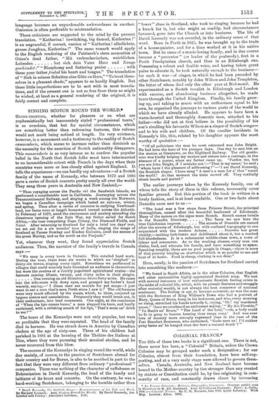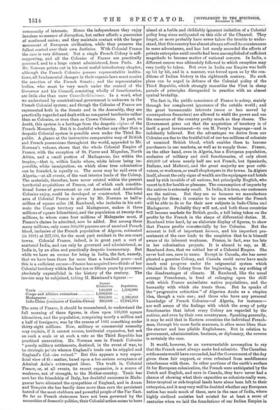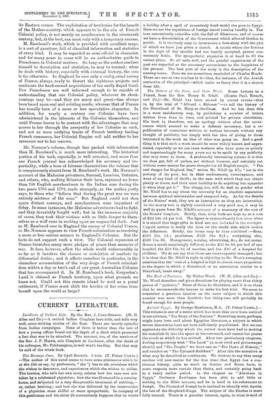COLONIAL FRANCE.* Tin: title of these two books is a
significant one. There is not, there never has been, a "Colonial" Britain, unless the Crown Colonies may be grouped under such a designation ; for our Colonies, almost from their foundation, have been self-sup. porting, and at a very early stage were allowed to govern them. selves. Canada, Australia, and New Zealand have become bound to the Mother-country by ties stronger than any created by statute or Constitution could be, by ties originating in com- munity of race, and constantly drawn closer by increasing
• La France Colonials: Risioire, Olograghie, Commerce. Ouvrege pabli6 sons In Direction de M. Alf. Itamband. Ares 12 Cartes en Couleur, Paris: A. Colin. 1866.—Colonial France. By C. 11. Norman, late 00th Light Infantry. With Map. London: Allen, 1888.
community of interests. Hence the independence they enjoy involves no menace of disruption, but rather affords a guarantee of continued union; and they maintain contact with the larger movement of European civilisation, while they preserve the fullest control over their own destinies. With Colonial France the case is very different. Not a single French Colony is self- supporting, and all the Colonies of France are practically governed, and to a large extent administered, from Paris. As Mr. Norman points out in his most useful introductory chapter, although the French Colonies possess representative institu- tions, all fundamental changes in their organic laws must receive the sanction of the French Senate ; and the representative bodies, who must be very much under the control of the Governor and his Council, consisting wholly of functionaries, are little else than mere Conseils-Generawx. In a word, what we understand by constitutional government is unknown in the French Colonial system; and though the Colonies of Prance are represented both in the Senate and in the Assembly, they are practically regarded and dealtwith as conquered territories rather than as Colonies, or even than as Crown Colonies. In part, no doubt, this system is a heritage from the despotic regime of the French Monarchy. But it is doubtful whether any other than a despotic Colonial system is possible even under the Third Re- public. A glance at the instructive comparative map of British and French possessions throughout the world, appended to Mr. Norman's volume, shows that the whole Colonial Empire of France, with the exception of St. Pierre and Miquelon, North Africa, and a small portion of Madagascar, lies within the tropics,—that is, within limits where, white labour being im- possible, white immigration, on which alone true colonisation can be founded, is equally so. The same may be said even of Algeria,—at all events, of the vast interior lands of the Colony. The materials, therefore, have never existed within the present territorial acquisitions of France, out of which such constitu- tional forms of government as our American and Australian Colonies enjoy, could be developed or constructed. The total area of Colonial France is given by Mr. Norman as half-a- million of square miles (M. Rambaud, who includes in his esti- mate the Congo territory and Madagascar, makes it three millions of square kilometres), and the population at twenty-five millions, to whom some four millions of Malagasies must, if France's claims be admitted, now he added. But among these many millions, only some 300,000 persons are of unmixed French blood, inclusive of the French population of Algeria, estimated (in 1881) at 227,000, for the most part resident in the sea-coast towns. Colonial France, indeed, is in great part a sort of scattered India, and can only be governed and administered, as India is, by an alien and practically despotic bureaucracy. But while we have an excuse for being in India, the fact, namely, that we have been there for more than a hundred years—and this is a sufficient excuse—France has acquired two-thirds of her Colonial territory within the last ten or fifteen years by processes absolutely unparalleled in the history of the century. The invoice may be subjoined, taking M. Ramband's figures :—
KitrtTes.
Population.
Tunis 140,000 ... 1,500,000 Congo and African extensions
Madagascar 600,000 ... 4,000,000 Indo-China (exclusive of Cochin-China) 320,000 ... 17,945,054
The area of France, it should be remembered, to understand the fall meaning of these figures, is close upon 530,000 square kilometres, and the population, comprising nearly a million and a half of foreigners, was by the census of 1881 something under thirty-eight millions. Now, military or commercial necessity may explain, if it cannot excuse, territorial expansion, but not on such a scale or at such a rate as the Third Republic has practised annexation. Mr. Norman sees in French Colonies " purely military settlements, destined, in the event of war, to be strategic pots whence England's trade can be crippled and England's Colonies ruined." But this appears a very super- ficial view of th 3 matter, based upon a too serious acceptance of Admiral A.ube's extravagant ideas. The truth is, Colonial France, or, at all events, its recent expansion, is a source of weakness, not of strength, to the Mother-country. Tunis has cost her the friendship of Italy, her doubtful successes in Mada- gascar have alienated the sympathies of England, and in Anam and 'Penguin she has hardly done more than earn the persistent hatred of the moat stubborn and powerful people of the Far East. So far as French statesmen have not been governed by the necessities of domestic politics, their Colonial action seems to have aimed at a feeble and childishly ignorant imitation of a Colonial policy long since antiquated on this side of the Channel. They forget, or more probably have never taken the trouble to Under- stand, that this country has almost always refused its countenance to mere adventurers, and has but rarely seconded the efforts of private enterprise until results had been accomplished of sufficient magnitude to become matter of national concern. In India, a different course was ultimately followed to which exception may very justly be taken. But even in India our Empire was built up bit by bit, and in a manner, was forced upon us by the con- ditions of Indian history in the eighteenth century. No such pleas can be urged in defence of the Colonial policy of the Third Republic, which strongly resembles the First in cheap parade of principles disregarded in practice with an almost cynical brutality.
The fact is, the public conscience of Fragce is asleep, mainly through her complacent ignorance of the outside world ; and the great bureaucratic interests (more or less moved by unscrupulous financiers) are allowed to wield the power and use the resources of the country pretty much as they choose. The Government gifts out that the acquisition of territory is of itself a good investment—to use M. Ferry's language—and is indolently believed. But the advantages we derive from our Colonies are due to the fruitful toil of our ten millions of colonists of unmixed British blood, which enables them to become purchasers in our markets, as well as to supply these. France, on the other hand, even in Algeria, has a European population, exclusive of military and civil functionaries, of only about 400,000 (of whom nearly half are not French, but Spaniards, Italians, and Maltese), and the great majority are poor culti- vators, or workmen, or small shopkeepers in the towns. In Algiers itself, almost the only signs of wealth are the equipages and hotels used by rich invalids of all nations, but principally English, who resort to it for health or pleasure. The consumption of imports by the natives is extremely small. In India, it is true, our customers are the natives. But they are so because we manufacture cheaply for them ; it remains to be seen whether the French will be able to do so for their new subjects in Indo-China and Madagascar. Probably they will not, and both these countries will become markets for British goods, a toll being taken on the profits by the French in the shape of differential- duties. M. Rambaud tries hard, by an elaborate display of figures, to show that France profits commercially by her Colonies. But the account is full of important iacunce, and his imperfect pre- sentment of the case leads to the suspicion that he is himself aware of its inherent weakness. France, in fact, was too late in her colonisation projects. It is absurd to say, as M. Rambaud does, that we robbed her of a Colonial Empire. She never had one, save in name. Except in Canada, she has never planted a genuine Colony, and Canada could never have made much real progress under the seigneurial system which obtained in the Colony from the beginning, to say nothing of the disadvantages of climate. M. Rambaud, like the usual average Frenchman, is fond of enlarging upon the skill with which France assimilates native populations, and the humanity with which she treats them. But he speaks of the "progressive extinction" of Algerian Arabs as a utopian idea, though a vain one; and those who have any personal knowledge of French Colonies—of Algeria, for instance— are well aware of the feelings with which the army of petty functionaries that infest every Colony are regarded by the natives, and even by their own countrymen. Speaking generally, it may be said that in Eastern countries the individual French- man, through his more facile manners, is often more liken than the sterner and lees pliable Englishman. But in relation to government, administration, business, or diplomacy, the reverse is certainly the case.
It would, however, be an unwarrantable assumption to tidy that the French must always make bad colonists. The Canadian settlements would have succeeded, had the Government of the day given them fair support, or even refrained from meddlesome interference with them. In other portions of the earth's surface fit for European colonisation, the French were anticipated by the Dutch and English, and save in Canada, they have never had a chance of showing what their capacities as colonists really were. Inter-tropical or sub-tropical lands have alone been left to their enterprise, and it may very well be doubted whether any Enrdpean nation has made much of these, save in the case of India, where highly civilised societies had existed for at least a score of centuries when we laid the foundations of our Indian Empire in
its Eastern corner. The exploitation of territories for the benefit of the Mother-country, which appears to be the aim of French Colonial policy, is not merely an anachronism in the nineteenth century, but, at the best, can meet only with a temporary success.
M. Ramba.o.d's work, which is provided with excellent maps, is a sort of gazetteer, full of classified information and statistics of every kind. It may be regarded as semi-official in character, and for many years to come will be an authoritative guide to Frenchmen in Colonial matters. So long as the author confines himself to description and statistics, he may be trusted; when he deals with history, especially with external history, the case is far otherwise. In England he sees only a crafty, cruel enemy of France, always ready to thwart the righteous projects and confiscate the hard-earned acquisitions of too easily duped Gaul. Few Frenchmen are well informed enough to be capable of understanding that our Colonial policy, whatever its short- comings may be—and they are many and great—has always been based upon real and existing needs; whereas that of France has usually been of a more or less speculative character. In addition, for nearly a century our Colonies have been administered in the interests of the Colonies themselves, and until France learns to be content with the advantages that may accrue to her through the prosperity of her Colonies as such, and not as mere outlying tracts of French territory feeding French commerce, her Colonial Empire will add neither to her resources nor to her renown.
Mr. Norman's volume, though less packed with information than M. Rambaud's, is much more interesting. The historical portion of his task, especially, is well executed, and more than one French journal has acknowledged his accuracy and im- partiality, while a tone of fairness characterises the volume that is conspicuously absent from M. Rambaud's work. Mr. Norman's account of the Malonine privateers, Snrconf, Lememe, Datertre, and others, who, making Reunion their base, captured no fewer than 788 English merchantmen in the Indian seas during the two years 1793 and 1794, reads strangely, as the anther justly says, to those who "believe that during the great war we were entirely mistress of the seas." But England could not then spare distant convoys, and merchantmen were impatient of delay. In some instances, the Malonine adventurers had to fight, and they invariably fought well; but in the immense majority of cases, they took their victims with as little danger to them- selves as a wolf runs in rushing upon an unguarded flock. Just as M. Rambaesd sees in England the enemy of Colonial France, so Mr. Norman appears to view French colonisation as involving a more or less serious menace to England's Colonies. But the facts do not support such a view. The Colonial expansion of France furnishes many more pledges of peace than menaces of war. It does, however, affect the whole world unfavourably in so far as it involves the closure or restriction of markets by differential duties ; and it affects ourselves in particular, in the shameless accumulation of the very dregs of French criminal- dom within a day or two's sail of our great Australian Colonies that has accompanied it. In M. Ramband's book, Kerguelen's Land is claimed as French territory, upon what grounds we know not. Could not this remote island be used as a penal settlement, if France must shift the burden of her crime from herself upon the world at large ?




















































 Previous page
Previous page